Hey YA fans:
It’s time to talk books with an author who you’re going to be glad you got to know!
“What’s Up In YA?” is sponsored by Disney Publishing Worldwide.
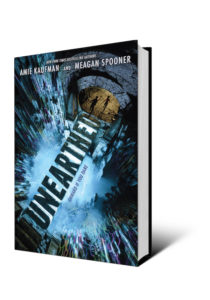 Indiana Jones meets Lara Croft in space! An epic sci-fi adventure, the first in a duology, from the New York Times best-selling authors of the Starbound trilogy. When Earth intercepts a message from a long-extinct alien race, it seems like the solution humanity has been waiting for. The Undying’s advanced technology has the potential to undo environmental damage and turn lives around, and their message leads to the planet Gaia, a treasure trove waiting to be explored.
Indiana Jones meets Lara Croft in space! An epic sci-fi adventure, the first in a duology, from the New York Times best-selling authors of the Starbound trilogy. When Earth intercepts a message from a long-extinct alien race, it seems like the solution humanity has been waiting for. The Undying’s advanced technology has the potential to undo environmental damage and turn lives around, and their message leads to the planet Gaia, a treasure trove waiting to be explored.
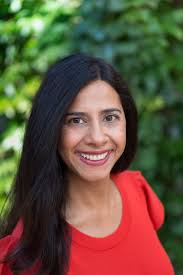 I’m really excited to share this interview with debut novelist Samira Ahmed. Her book, Love, Hate, & Other Filters hits shelves tomorrow, January 16. It’s likely you’ve seen the book’s catchy cover and read the description and needed it on your TBR ASAP.
I’m really excited to share this interview with debut novelist Samira Ahmed. Her book, Love, Hate, & Other Filters hits shelves tomorrow, January 16. It’s likely you’ve seen the book’s catchy cover and read the description and needed it on your TBR ASAP.
This interview will make you want it even more…and it’s going to substantially add other books to your to-read, too.
Without further ado, a chat with Samira!
Give us the pitch for your book:
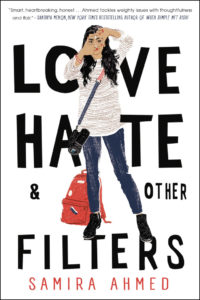 Love, Hate & Other Filters is a story about a girl who is Indian and Muslim, a child of immigrants and also a girl like all the other girls—she has hopes and dreams and crushes. She has to confront bullying and Islamophobia and faces a world trying to tell her who she should be and what she should do. She’s an American girl who is trying to figure things out and forge a path of her own choosing.
Love, Hate & Other Filters is a story about a girl who is Indian and Muslim, a child of immigrants and also a girl like all the other girls—she has hopes and dreams and crushes. She has to confront bullying and Islamophobia and faces a world trying to tell her who she should be and what she should do. She’s an American girl who is trying to figure things out and forge a path of her own choosing.
Tell us a bit about when you began writing and your journey from aspiring author to published author:
I’ve been writing in some form or another since I was in about 3rd or 4th grade. I kept journals and wrote poetry. Really, really bad poetry. But hey! I didn’t let that stop me from writing for myself because I really loved it.
It wasn’t until much, much later–after I’d already been a high school teacher and worked in education non-profits–that I began to even start thinking about writing a book and, maybe, even trying to get it published.
I know there is a lot of pressure on young writers to be published by 25 or 30, but that wasn’t me. It wasn’t something I even dreamed about at that time. But I really think it is so important to know there is no expiration date on having dreams.
LH&OF is your debut novel, and while you’ve yet to experience a year as a debut, your book has been hitting radars for a few months pre-pub now. Tell us a bit about what it’s like being a first-time author and hearing from eager and excited readers:
Probably one of the most amazing experiences I had was when I walked into BEA and saw my ARC and held it for the very first time. A young woman next to me asked if she could look at it and remarked that it was the first time she’d ever seen herself in a cover. That floored me. Other readers shared similar sentiments.I’m so deeply grateful to hear readers say that, to see messages and tweets from kids who say they are excited to catch a small glimpse of themselves on the page.
I’ve also met folks who don’t look like my main character, who don’t share her experiences but still connect with my book. One teacher emailed me to say he had never considered what it must feel like for a Muslim teen to live in today’s world—one fraught with Islamophobia and assumptions about who they are and what they believe. His honesty and willingness to open his mind to new ideas was a reminder for me about the importance of books being both mirrors and windows.
The last few months have been absolutely surreal. It’s so humbling and I know how incredibly lucky I am.
Maya, your main character, is an Indian American Muslim girl who struggles between being the “good Indian daughter” and forging her own story. She’s got dreams and goals she wants to pursue, but it’s not only her own personal heritage that challenge her — it’s also the experience of being an Indian American Muslim girl in a world where she’s discriminated against for this very thing. Can you talk a bit about what drew you to writing this character and how you were able to craft multiple intersections along Maya’s journey?
It would be hard for me to write a character without multiple intersections, namely because that is my own experience. Code-switching is an inextricable part of my life; it’s in my DNA and necessarily so.
I grew up, like Maya, in a very White town—the first South Asian, Muslim family to move there. Think about that. It’s wild, right? So basically, I had to adapt very quickly to being “different.” I had to learn to hear the microaggressions but not internalize them. I had to learn to hear the awful things people would say but not fall apart, at least on the outside. But I’m not unique in that, not at all. Any child of color or from a religious minority or who is LGBQTIA or disabled or from any other marginalized group understands, deeply, my experiences. In fact, even with my various intersections, I still have and recognize my privileges. Others have to contend with much worse.
I wanted to give voice to that life—one where you have a foot in each of your different worlds, where you struggle to put all those pieces together to make a whole, where you are “othered” merely for being who you are. I wanted to show a young woman who faces obstacles but who is resilient. Who makes choices for herself, sometimes very difficult ones, because when the world around her is saying NO, she’s saying YES, to herself.
You and I talked together on a panel at a recent teacher conference, along with Jennifer Mathieu (author of Moxie) on the topic of feminism. Can you talk a bit to what feminism in young adult literature looks like and how it is we — as readers, as writers, as teachers, as librarians — can encourage dialog about feminism through what it is we’re reading?
I had such fun on that panel with you guys! And it was so inspiring to hear what both you and Jennifer had to say—especially about the need for introspection and uncomfortable conversations and inclusivity. Feminism needs to be intersectional to be truly effective in building a world where demography is not destiny.
One thing I absolutely love about some of what I’m seeing in young adult literature is young women who are unapologetic about who they are and what they want. That doesn’t mean that they’re not flawed, as are we all. It doesn’t mean they’re not searching. It doesn’t mean they’re not facing obstacles and challenges. It means that they are beginning to understand the importance of their own agency in their lives and their value in the world as individuals and know their full potential. It means they are forming their politics and speaking their truths.
I also think we are seeing that boys in YA can be feminists, too. That they are stumbling and learning and figuring out their role in the patriarchy. The idea that women’s right are human rights and that we should be treated equally is not and should not be a radical notion.
It is absolutely necessary for all of us who talk to and engage with young readers—any readers really—to open a conversation about feminism, even beginning with defining the word and talking about why the word itself isn’t pejorative, but empowering and universal and necessary. We are living in a time where we’ve heard the President speak of women in terribly demeaning terms, even bragging about sexual assault. We’ve seen brave women come forward and speak about the sexual harassment and abuse they’ve suffered, about the code of silence and wall of protection that allows men to face little to no consequences for their actions. I’ve seen lots of men shocked that such things could happen in the workplace, but I haven’t met a woman yet who is surprised because we seen it; we’ve experienced it. We live in a world of inherent inequities and the only way we can begin to dismantle the power structure that allows them, is to have some uncomfortable conversations. Lean into the discomfort and open those necessary dialogues about sexism and misogyny and racism and how those intersect and about how feminism isn’t merely a word to be discussed, but a way to live your life.
Who are your favorite authors in your own reading life? Who do you think is doing some of the most interesting, provocative, and creative work in the YA world?
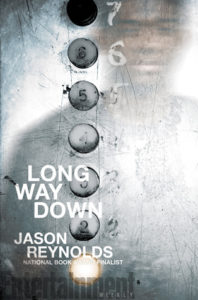 I am consistently stumped by this question. It’s so hard for me to choose!
I am consistently stumped by this question. It’s so hard for me to choose!
Recently, I’ve absolutely been loving the writing of Mohsin Hamid. It’s so subtle, almost quiet, then it completely wallops you and he is such a fine craftsmen. He wrote the most moving 2nd person book I’ve ever read..
Young Adult literature is absolutely in a golden age right now.
As far as creative, provocative work goes, the first name that comes to mind is Jason Reynolds who is brilliant and yet somehow ups his game with every subsequent effort. I love that he challenges himself even while he’s challenging us, the readers.
For both lyrical writing, brilliant detail and the kind of historical research my nerdy heart loves, I recommend Heidi Heilig. I will read anything she writes.
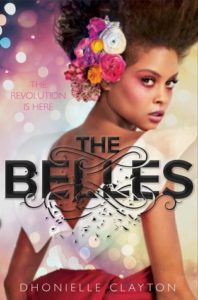 THE BELLES by Dhonielle Clayton comes out in February and I was blown away at how she creates this lush, brilliant world and then addresses hard truths about the socio-political costs of beauty and the expectations and unfair double standard women contend with every day.
THE BELLES by Dhonielle Clayton comes out in February and I was blown away at how she creates this lush, brilliant world and then addresses hard truths about the socio-political costs of beauty and the expectations and unfair double standard women contend with every day.
What I love about Adam Silvera’s writing is the textural emotionality of his words. You can almost feel them. He centers gay men of color and brings them to life with wonderful emotional depth and they totally gut you.
When speaking of lyrical writing with incredible emotional complexity Anna-Marie McLemore’s name always comes to mind. She’s introducing magical realism to a brand new audience. And she’s awesome.
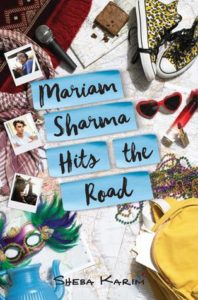 I’m also going to give a shout out to two Muslim-American writers—Aisha Saeed and Sheba Kareem—who wrote some of the first YA books with Muslim rep that I read. I can’t wait for their next books, AMAL UNBOUND and MARIAM SHARMA HITS THE ROAD. Muslims in America are not a monolith and Saeed and Kareem show the wonderful diversity of our community, steering readers away from that myopic single narrative with characters whose unique experiences and depth is rich and wonderful and sometimes heartbreaking.
I’m also going to give a shout out to two Muslim-American writers—Aisha Saeed and Sheba Kareem—who wrote some of the first YA books with Muslim rep that I read. I can’t wait for their next books, AMAL UNBOUND and MARIAM SHARMA HITS THE ROAD. Muslims in America are not a monolith and Saeed and Kareem show the wonderful diversity of our community, steering readers away from that myopic single narrative with characters whose unique experiences and depth is rich and wonderful and sometimes heartbreaking.
If there’s one book that you could go back and hand your 12-year-old self, what would it be and why?
THE NAMESAKE by Jhumpa Lahiri. It’s not YA and some of the ideas might have gone over my 12-year-old self’s head, but at that age I was really loving family dramas and there was no family story that I could really see myself in. THE NAMESAKE was probably the first book that I read where I could really feel the struggles the characters felt—trying to find balance in an imbalanced world. Gogol’s struggle to find himself, especially in his younger years would have felt both familiar and validating to me. And also, this might seem like a small detail, but I experienced the same challenges with my name that Gogol did—it would’ve been amazing to have known I wasn’t the only one.
____________________
Thanks for hanging out — and a big thank you to Samira — and we’ll see you back here again next week.
–Kelly Jensen, @veronikellymars